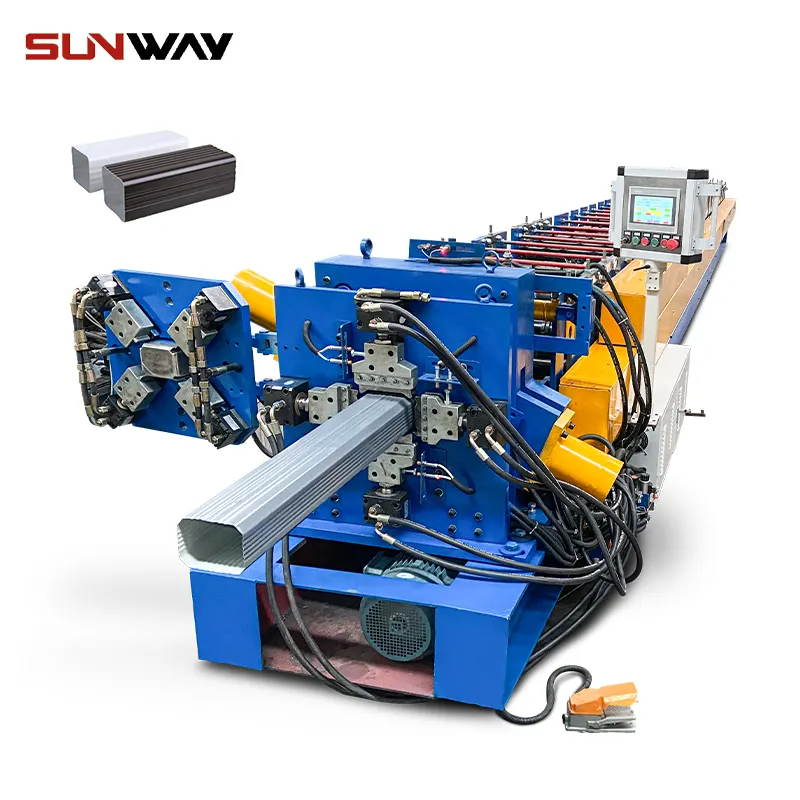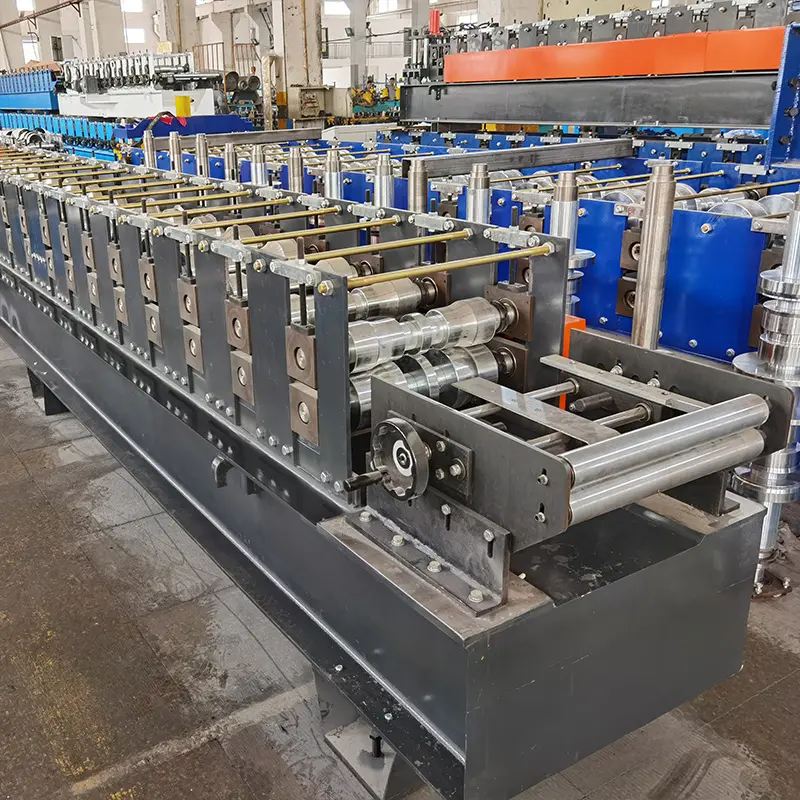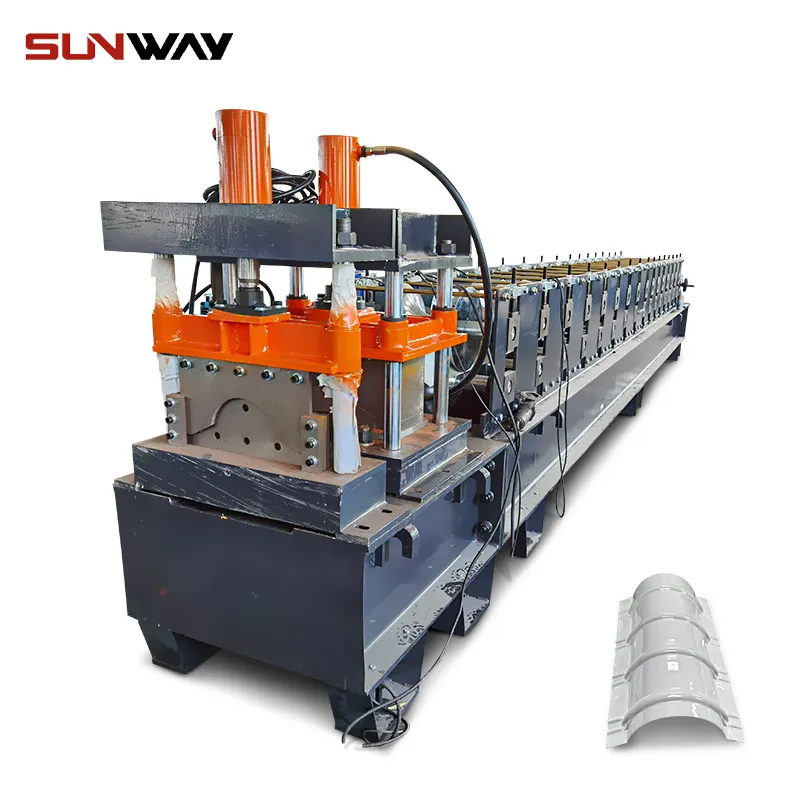ভূমিকা
In the dynamic world of construction, innovation is constantly shaping the way we build. One such innovation that has significantly impacted the roofing industry is the Steel Tile Roll Forming Machine. This powerful piece of equipment has revolutionized the way metal roofing tiles are manufactured, providing a cost-effective and efficient solution for producing high-quality roofing materials.
What is a Steel Tile Roll Forming Machine?
ক Steel Tile Roll Forming Machine is a specialized piece of equipment used in the manufacturing process of metal roofing tiles. It is designed to transform flat metal coils, typically made of steel or aluminum, into perfectly shaped roofing tiles with consistent profiles. The machine achieves this through a continuous roll forming process, where the metal coil passes through a series of rollers and dies that gradually shape it into the desired tile profile.
How Does a Steel Tile Roll Forming Machine Work?
The operation of a Steel Tile Roll Forming Machine involves several essential steps:
- Uncoiling: The process begins with the uncoiler, which holds the metal coil. The coil is unwound, and its end is fed into the roll forming machine.
- Feeding System: The feeding system guides the metal coil into the roll forming unit steadily and accurately, ensuring a smooth and precise forming process.
- Roll Forming Unit: The heart of the machine lies in the roll forming unit. It consists of a series of rollers and dies, each set responsible for shaping a specific part of the tile profile. As the metal passes through these rollers, it gradually takes on the desired shape.
- Cutting System: Once the metal has taken its final form, the cutting system comes into action, slicing the continuous profile into individual tiles of the desired length.
- নিয়ন্ত্রণ ব্যবস্থা: The entire operation of the machine is controlled and monitored through an advanced control system. This system allows for adjustments and fine-tuning to ensure precise and consistent output.

Advantages of Using a Steel Tile Roll Forming Machine
খরচ-কার্যকর উৎপাদন
The Steel Tile Roll Forming Machine offers a cost-effective solution for metal roofing tile production. Its efficient roll forming process reduces material wastage, and the ability to produce large volumes of tiles in a short time translates to lower production costs per unit.
Versatility and Customization Options
With the ability to create a wide range of tile profiles, the Steel Tile Roll Forming Machine provides manufacturers with exceptional design flexibility. Customization options are abundant, allowing roofing companies to cater to various customer preferences and architectural styles.
উচ্চ উৎপাদন দক্ষতা
The continuous roll forming process ensures a high production rate, meeting the demands of large-scale roofing projects. The machine’s automated operation reduces manual labor, leading to increased efficiency and output.
Durability and Longevity of Products
Metal roofing tiles produced by the Steel Tile Roll Forming Machine boast superior durability and longevity. They can withstand harsh weather conditions, including heavy rain, strong winds, and even hail, outperforming many traditional roofing materials.
Types of Steel Tile Roll Forming Machines
There are several types of Steel Tile Roll Forming Machines available, each with its own unique features and applications:
Single Layer Steel Tile Roll Forming Machine
The Single Layer Steel Tile Roll Forming Machine is designed to produce single-profile roofing tiles. It is an excellent choice for standard roofing designs and projects that require consistent tile profiles throughout.
Double Layer Steel Tile Roll Forming Machine
The Double Layer Steel Tile Roll Forming Machine has the capability to produce two different tile profiles on the same machine. This offers increased versatility and efficiency, making it ideal for manufacturers with varying product demands.
Multi-Layer Steel Tile Roll Forming Machine
The Multi-Layer Steel Tile Roll Forming Machine takes versatility to the next level by producing multiple profiles in a single run. Manufacturers can create complex roofing designs with ease, catering to niche markets and specialty projects.
Components of a Steel Tile Roll Forming Machine
A Steel Tile Roll Forming Machine is composed of several key components that work in harmony to achieve its remarkable capabilities:
আনকোয়লার
The uncoiler holds and releases the metal coil, ensuring a continuous supply of material for the roll forming process.
ফিডিং সিস্টেম
The feeding system guides and feeds the metal coil into the roll forming unit accurately, preventing any misalignment during the forming process.
Roll Forming Unit
The roll forming unit consists of rollers and dies that shape the metal coil into the desired tile profile.
কাটিং সিস্টেম
The cutting system is responsible for cutting the continuous profile into individual tiles of the required length.
নিয়ন্ত্রণ ব্যবস্থা
The control system governs the machine’s operation, allowing operators to adjust and monitor the roll forming process effectively.

Factors to Consider When Choosing a Steel Tile Roll Forming Machine
When selecting a Steel Tile Roll Forming Machine for your roofing business, several factors should be taken into account:
Production Capacity and Speed
Consider the machine’s production capacity and speed to ensure it aligns with your business’s demands.
উপাদান সামঞ্জস্যতা
Check if the machine can handle the type and gauge of metal coils you intend to use.
Machine Dimensions and Space Requirements
Ensure the machine’s size fits your production facility and allows for smooth operation.
অটোমেশন এবং নিয়ন্ত্রণ বৈশিষ্ট্য
Opt for machines with advanced automation and control features to enhance efficiency and ease of operation.
রক্ষণাবেক্ষণ এবং সহায়তা
Choose a machine from a reputable manufacturer that offers reliable maintenance and technical support.
Common Applications of Steel Tile Roll Forming Machines
The applications of Steel Tile Roll Forming Machines extend beyond roofing. They are widely used in various industries for different purposes:
Residential Roofing: The most common application of steel tile roll forming machines is in the residential roofing industry. Metal roofing tiles are favored for their durability, longevity, and aesthetic appeal. Homeowners often choose steel tile roofs as they offer superior protection against the elements and require minimal maintenance over the years.
Commercial Buildings: Steel tile roll forming machines are also extensively used in commercial construction projects. Large-scale buildings such as warehouses, factories, and shopping malls often opt for metal roofing due to its cost-effectiveness and the ability to cover expansive areas with ease.
Agricultural Structures: The agricultural sector benefits from steel tile roll forming machines as well. Farm buildings, barns, and agricultural warehouses commonly feature metal roofing due to its resilience against harsh weather conditions and its ability to protect valuable agricultural equipment and produce.
Infrastructure Projects: Infrastructure developments, such as train stations, bus terminals, and public facilities, frequently incorporate metal roofing tiles. The high production efficiency of steel tile roll forming machines makes them a practical choice for large-scale projects.
Residential Cladding: In addition to roofing, steel tile roll forming machines can produce metal cladding panels used for siding residential buildings. Metal cladding offers excellent weather resistance and can enhance the overall appearance of a structure.
Architectural Accents: Modern architects often use steel tile roll forming machines to create unique architectural accents for buildings. Metal tiles can be used to design decorative facades, awnings, and other eye-catching elements.
DIY Home Improvement: The popularity of DIY home improvement projects has led to an increased demand for metal roofing materials accessible to homeowners. Some manufacturers produce portable and user-friendly roll forming machines suitable for small-scale use.
Energy-Efficient Solutions: Metal roofing tiles, produced by steel tile roll forming machines, contribute to energy-efficient solutions. The reflective properties of metal help to reduce heat absorption, resulting in lower cooling costs for buildings.
Green Building Initiatives: With an increasing focus on sustainable construction, steel tile roll forming machines play a part in green building initiatives. Metal roofing is often made from recycled materials and can be recycled again at the end of its lifespan, reducing environmental impact.

Safety Precautions When Operating a Steel Tile Roll Forming Machine
While steel tile roll forming machines offer numerous benefits, safety should always be a top priority when operating this equipment. Implementing the following safety precautions is crucial:
- Operator Training: Ensure that operators receive proper training on how to use the machine safely and efficiently.
- Protective Gear: Operators should wear appropriate personal protective equipment, including safety glasses, gloves, and ear protection.
- Machine Maintenance: Regularly inspect and maintain the machine to ensure it operates at its best and minimizes the risk of accidents.
- Emergency Stop: The machine should be equipped with an emergency stop button that can quickly shut down the operation if necessary.
- Material Handling: Exercise caution when handling metal coils and finished tiles to prevent injuries.
- Machine Guards: Install safety guards on moving parts to prevent accidental contact during operation.
Tips for Maintaining a Steel Tile Roll Forming Machine
Proper maintenance is essential to keep a steel tile roll forming machine in optimal condition and prolong its lifespan. Here are some maintenance tips:
- Regular Lubrication: Keep the machine’s moving parts well-lubricated to reduce friction and prevent wear and tear.
- Cleanliness: Keep the machine and its surroundings clean to avoid dust and debris buildup that could affect the machine’s performance.
- Inspect Electrical Components: Regularly inspect and test electrical components to ensure they are functioning correctly and safely.
- Alignment Checks: Periodically check and adjust the alignment of rollers and dies to maintain the quality of the produced tiles.
- Replace Worn Parts: Replace any worn or damaged parts promptly to prevent further damage to the machine.
The Future of Steel Tile Roll Forming Machines
The future of steel tile roll forming machines looks promising. As technology continues to advance, we can expect to see further improvements in machine efficiency, automation, and customization capabilities.
Manufacturers will likely focus on developing more eco-friendly solutions, incorporating sustainable materials and energy-efficient processes into their machines. Additionally, advancements in materials science may lead to the introduction of innovative metal alloys for enhanced roofing performance.

উপসংহার
In conclusion, the steel tile roll forming machine has revolutionized the roofing industry, providing an efficient and cost-effective solution for producing high-quality metal roofing tiles. Its ability to create a wide range of tile profiles and applications makes it a versatile choice for various construction projects.
As the demand for sustainable building materials and energy-efficient solutions increases, the steel tile roll forming machine is poised to play a significant role in shaping the future of roofing and construction. By embracing safety practices and proper maintenance, businesses can maximize the benefits of this remarkable piece of equipment.
প্রায়শই জিজ্ঞাসিত প্রশ্ন (এফএকিউ)
1. Are steel tile roofs more expensive than traditional roofing materials?
Metal roofing tiles, including those produced by steel tile roll forming machines, may have a higher initial cost than some traditional materials. However, their longevity, low maintenance requirements, and energy efficiency can result in long-term cost savings.
2. Can steel tile roll forming machines handle different metal thicknesses?
Yes, steel tile roll forming machines are designed to handle various metal thicknesses. Manufacturers can adjust the machine settings to accommodate the specific gauge of the metal coil being used.
3. How long does it take to set up a steel tile roll forming machine?
The setup time for a steel tile roll forming machine depends on its complexity and the experience of the operators. Once properly installed and calibrated, the machine can start producing tiles almost immediately.
4. Are metal roofing tiles suitable for all climates?
Yes, metal roofing tiles are designed to withstand various weather conditions, including rain, snow, and high winds. They offer excellent durability and resistance to corrosion, making them suitable for a wide range of climates.
5. Can I use a steel tile roll forming machine for other metal profiles besides roofing tiles?
While steel tile roll forming machines are primarily used for producing roofing tiles, some models may have the versatility to create other metal profiles for applications such as cladding and decorative elements. However, it’s essential to check the machine’s specifications and capabilities for specific use cases.
Frequently Asked Questions (FAQ)
- What line speed can Steel Tile Roll Forming Machines achieve for roofing tiles?
- Typical speeds range 10–25 m/min for embossed or stepped tiles, and up to 40–60 m/min for simple corrugated/metal shingles depending on material thickness, embossing depth, and in-line punching.
- Which coatings work best for tile aesthetics and corrosion resistance?
- AZ150–AZ200 (aluzinc) and Z275 galvanized are common; pre-painted coils with PVDF or SMP topcoats deliver superior UV and salt-spray resistance for coastal projects.
- How do I minimize oil canning and surface defects on pre-painted tiles?
- Use crowned/ground rollers, maintain precise entry leveling, keep stand alignment within ±0.02 mm, and reduce roller pressure on early passes. Clean, felt-lined guides prevent scuffing on color-coated steel.
- What power and air requirements are typical for a tile line?
- Power: 15–45 kW for standard single-layer lines; double-layer/multi-layer with embossing may require 45–90 kW. Compressed air: 0.6–0.8 MPa for pneumatic cutters/stackers; flow 0.3–0.8 m³/min.
- Can Steel Tile Roll Forming Machines process aluminum for lightweight tiles?
- Yes. 3003/3004 series (0.6–0.9 mm) are commonly used; adjust forming passes to limit springback and add anti-marring guides for soft substrates.
2025 Industry Trends for Steel Tile Roll Forming Machines
- High-reflectance cool roof coatings (solar reflectance index SRI ≥ 80) drive demand for pre-painted coils for energy codes (IECC/ASHRAE 90.1 updates).
- AI-enabled visual inspection detects paint defects, micro-scratches, and emboss misalignment in real time, reducing rework by 12–20%.
- Quick-change cassettes for tile patterns (Roman, Bond, Shingle) cut changeover to 20–35 minutes with recipe-driven servo setups.
- Growth markets: APAC and Africa for affordable housing; rooftop PV-ready metal tiles with integrated mounting bosses rise rapidly.
- Sustainability: increased use of recycled content steel (≥30%) and EPD-backed coils for green certifications (LEED v4.1, BREEAM).
2025 Market and Performance Benchmarks
| Metric (2025) | Value/Range | Notes/Source |
|---|---|---|
| Global metal roofing market size | ~$23–26B | Grand View Research; Metal Construction Association (2025) |
| Share of steel tile segment | ~18–22% of metal roofing | Industry briefs, MCA (2025) |
| Typical line speed (embossed/step tile) | 10–25 m/min | OEM specs (Formtek, Metform, 2024–2025) |
| Changeover time with cassettes | 20–35 min | Vendor application notes (2025) |
| Scrap reduction via AI inspection | 12–20% | Keyence/Cognex case data (2024–2025) |
| Energy savings (regen drives/VFD) | 8–15% | OEM audits (2023–2025) |
| Cool roof energy savings (cool climates warm-season) | 7–15% cooling energy | U.S. DOE, LBNL Cool Roofs resources |
Selected sources:
- Metal Construction Association: https://www.metalconstruction.org
- U.S. DOE/LBNL Heat Island/Cool Roofs: https://heatisland.lbl.gov
- Keyence, Cognex application notes: https://www.keyence.com, https://www.cognex.com
- Grand View Research (Metal Roofing Market, 2025): https://www.grandviewresearch.com
Latest Research Cases
Case Study 1: AI Vision + Laser Profiling for Color-Coated Steel Tiles (2025)
- Background: A roofing manufacturer producing Roman tiles from 0.5 mm pre-painted AZ150 steel faced 6.5% rework due to paint micro-scratches and step emboss misalignment.
- Solution: Integrated 3D laser profile gauges and AI vision to monitor emboss depth and surface defects; added servo-controlled stand adjustment with recipe locking. Implemented felt-lined, low-friction guides at the entry.
- Results: Rework dropped to 2.1%; overall scrap reduced by 15%. First-pass yield improved from 92.8% to 98.2%. Throughput increased 9% due to fewer stoppages.
Case Study 2: Quick-Change Double-Layer Line for Bond + Shingle Tiles (2024)
- Background: A regional supplier needed to run short batches across two popular profiles without lengthy downtime.
- Solution: Deployed a double-layer Steel Tile Roll Forming Machine with cassette tooling, automatic coil loading, and servo step-cut synchronization. Added ERP-linked recipe management.
- Results: Changeover time cut from 70 to 28 minutes; OEE up 12%. Inventory turns improved from 6.1 to 8.0. Energy per m² down 10% via adaptive line speed and regenerative braking.
Expert Opinions
- Rob Haddock, Founder and CEO, Metal Roof Advisory Group
- Viewpoint: “For color-coated steel tiles, surface handling is as critical as forming. Roller finish, guide materials, and coil cleanliness dictate long-term appearance.”
- Source: MRAG technical seminars and publications (2024–2025)
- Dr. S.K. Dharmar, Materials Scientist, Former Chair—Galvanized/Aluzinc Coatings Committee (ASM International)
- Viewpoint: “AZ-coated substrates paired with PVDF topcoats offer the best corrosion/UV balance for coastal tile applications—provided cut edges are managed and fastener compatibility is ensured.”
- Source: ASM/industry conference proceedings (2024–2025)
- Mark Thompson, VP Engineering, Formtek Group
- Viewpoint: “Servo step control and cassette tooling are the fastest path to profitable high-mix tile production without sacrificing dimensional repeatability.”
- Source: Formtek webinars (2025)
Practical Tools/Resources
- COPRA RF (UBeCo): Roll forming flower design and stand load analysis
- https://www.ubeco.com
- SolidWorks + Simufact Forming: Tooling and process simulation for tile profiles and embossing
- https://www.mscsoftware.com/product/simufact-forming
- Keyence LJ-V/IV series and Cognex In-Sight: In-line defect detection for pre-painted coils
- https://www.keyence.com, https://www.cognex.com
- European Coil Coating Association (ECCA): Best practices for pre-painted steel handling
- https://www.prepaintedmetal.eu
- Metal Construction Association (MCA) Technical Resources: Metal roofing details, testing, and performance
- https://www.metalconstruction.org
- Cool Roof Rating Council (CRRC): Rated products and SRI data
- https://coolroofs.org
- OSHA Machine Guarding eTool; ISO 12100 machine safety
- https://www.osha.gov/etools/machine-guarding, https://www.iso.org
Last updated: 2025-10-21
Changelog: Added FAQs tailored to Steel Tile Roll Forming Machines; included 2025 trends with benchmark table and sources; provided two recent case studies; compiled expert opinions; listed practical tools and standards
Next review date & triggers: 2026-04-21 or earlier if coating standards (CRRC/ENERGY STAR) or machine safety/AI inspection standards change, or if new cassette/servo technologies materially impact changeover benchmarks
